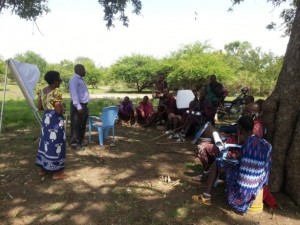Morogoro, TZ – SAWA continues work on WaSH and livelihood projects – 24 May 2015
From February through April 2015 SAWA continued progress on their Twarumbwa Project in Kilosa District, Morogoro Region. The project is supporting water infrastructure and livelihood projects for 5 communities in the Kilosa District. Two of the communities are pastoralist communities and three are villages.
 Mbwade is one of the pastoralist communities. In Mbwade SAWA was working hard to complete as much of their work as possible before heavy rains made the community inaccessible. The organization oversaw construction of a cattle trough to ensure livestock in the area have sufficient water even during dry seasons. This livelihood project will make cattle healthier and help them grow faster, improving livelihoods for the community. A water point was also installed for community use and work was completed on a pump house for the generator and pump that will power the project. To ensure sustainability SAWA worked with stakeholders to design a management and operations model and codify that model with a constitution. Additionally, local engineers were trained to make routine maintenance and repairs of the pump. The pump must be serviced after every 400 hours of use to ensure lowest total cost of ownership.
Mbwade is one of the pastoralist communities. In Mbwade SAWA was working hard to complete as much of their work as possible before heavy rains made the community inaccessible. The organization oversaw construction of a cattle trough to ensure livestock in the area have sufficient water even during dry seasons. This livelihood project will make cattle healthier and help them grow faster, improving livelihoods for the community. A water point was also installed for community use and work was completed on a pump house for the generator and pump that will power the project. To ensure sustainability SAWA worked with stakeholders to design a management and operations model and codify that model with a constitution. Additionally, local engineers were trained to make routine maintenance and repairs of the pump. The pump must be serviced after every 400 hours of use to ensure lowest total cost of ownership.
 Rudewa is the second pastoralist community benefitting from SAWA’s work. SAWA organized the community to finish trenching work needed to supply water. They also built a water intake chamber to feed the gravity powered system. SAWA also helped with livelihood projects in Rudewa sponsored by Heifer International. Projects included vaccinations as well as caretaking training for program beneficiaries. The final 70 beneficiaries (out of a total of 480) were trained and 410 cockerels were supplied.
Rudewa is the second pastoralist community benefitting from SAWA’s work. SAWA organized the community to finish trenching work needed to supply water. They also built a water intake chamber to feed the gravity powered system. SAWA also helped with livelihood projects in Rudewa sponsored by Heifer International. Projects included vaccinations as well as caretaking training for program beneficiaries. The final 70 beneficiaries (out of a total of 480) were trained and 410 cockerels were supplied.
In the three villages SAWA focused primarily on training and capacity building. 82 people attended “Train the Trainer” sessions about home and school WaSH best practices. They will be able to train children and colleagues. SAWA also organized volunteers from Raleigh for a training and awareness building campaign celebrating Women’s Day on March 8th. The group demonstrated best practices including tippy-taps, hand-washing technique, water treatment, and community market cleaning.
To ensure sustainability of WaSH initiatives in the village SAWA trained pump operators from each village on project maintenance

